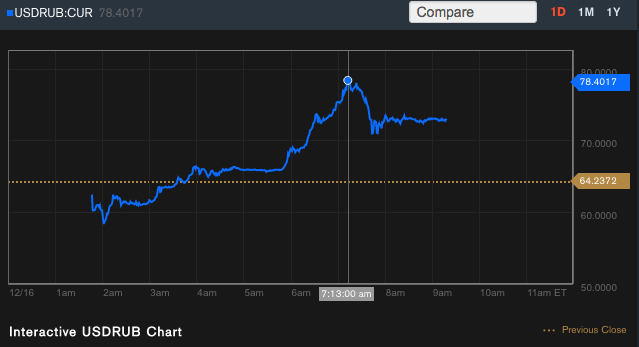The Russian ruble is crashing as oil prices plummet, putting President Vladimir Putin’s energy resource-dependent government under financial strain.
The United States dollar was fetching nearly 80 rubles during early trading Tuesday, a depreciation of nearly 50 percent over the year against the dollar.

Oil prices, which fell below $60 per barrel on the international Brent crude index for the first time since July 2009, may be the main culprit for the ruble’s year-long slide. Putin’s government derives roughly half its budget from oil and gas revenues, and many analysts are predicting a Russian recession in 2015.
The ruble exchange rate follows the price of oil, and “it’s always been like that,” Vladimir Dmitriev, chairman for Russian state-owned bank Vnesheconombank, recently told German newspaper Der Tagesspiegel. He estimated that the Russian economy lost $100 billion when oil prices fell from $110 per barrel to $80.
That could handcuff Putin’s ambitions, Sam Ori, executive vice president with Securing America’s Future Energy, said in a recent interview.
“This is probably going to take a little bit of steam out of [Putin’s] sails at this point,” Ori told the Washington Examiner. “Even if it lasts for only a year … it will take some options off the table.”
Struggles for the ruble also reflected an emergency interest rate hike to 17 percent, up from 10.5 percent, that some experts said might restrain the economy. Western sanctions resulting from Russia’s incursions into neighboring Ukraine also have played a role.
“While such drastic tightening measures will inflict more pain on the economy, we have been arguing for a while that it is not about preventing recession, but full-scale financial turmoil caused by the precipitous ruble fall,” said Piotr Matys, a currency strategist at Rabobank International in London, told Bloomberg.
Dmitriev said the combination of factors could result in a decline in growth to 0.3 percent this year “and perhaps a stagnation in the next.”

